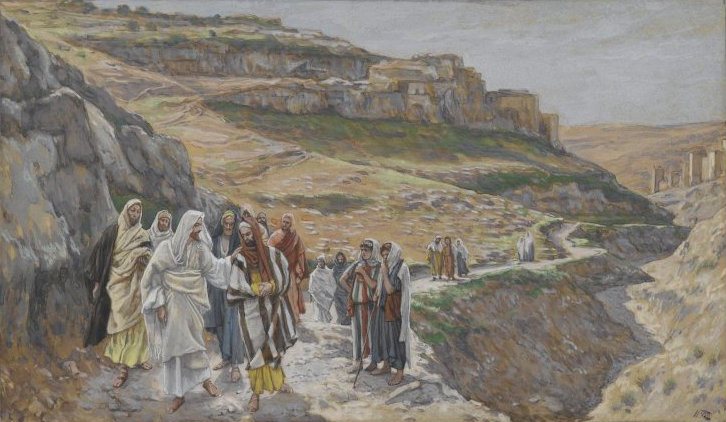Home l Liturgy & Sacraments l Liturgical Calendar
The Fourteenth Sunday after Pentecost – Sunday, September 3, 2023
Green vestments

The lessons of this Sunday’s office are often taken from Ecclesiasticus or Job, according as the Sunday falls in August (4th or 5th Sunday) or September (1st or 2nd Sunday).
Commenting on the former, St. Gregory says: “There are men all athirst for passing joys who are ignorant or indifferent where eternal blessings are concerned. Poor wretches! They congratulate themselves on possessing the good things of this life without regretting those of the world above, which they have lost. Fashioned for light and truth, they never lift up the eyes of the soul; never betray the smallest desire or longing for the contemplation of their eternal home. Giving themselves over to the pleasures among which they are thrown, they bestow their affection upon a dreary place of exile as if it were their fatherland; and surrounded by darkness, they are full of rejoicing as if they were illumined by a brilliant light. On the other hand the elect, in whose eyes fleeting goods are of no value, seek after those for which their souls were made. Kept in this world by the bonds of the flesh, each, none the less, is carried in spirit beyond it while making the wholesome resolve to despise the passing things of time and to desire the things which endure for eternity.”
As for Job, he is set before us in Holy Scripture as the very type of a man detached from the goods of this world. ” If,” said he, “we have received good things at the hands of God, why should we not receive evil?… The Lord gave, and the Lord hath taken away … Blessed be the name of the Lord.”
The proper of to-day’s Mass is inspired by the same thoughts The Holy Ghost, whom the Church received at Pentecost, has formed a new man in us who resists the outward manifestations of the old man, namely covetousness and the search for riches, in order to satisfy it. The Spirit of God is a spirit of liberty, who by making us children of God, our Father, and brethren of Jesus our Lord, frees us from the slavery of sin and the tyranny of concupiscence. ” They that are Christ’s, ” says St. Paul, ” have crucified their flesh with the vices and concupiscences.” ” Walk in the spirit, and you shall not fulfil the lusts of the flesh : for the flesh lusteth against the spirit and the spirit against the flesh; for these are contrary one to another” (Epistle). And our Lord says: “No man can serve two masters; for either he will hate the one and love the other, or he will sustain the one and despise the other. You cannot serve God and Mammon.”
St. Augustine, in expounding this passage, says: “Whoever is the slave of riches (and we know that only too often they are the source of pride, avarice, injustice and lust)1 is subject to a hard and wicked master. Entirely at the mercy of his passions, he is under the tyranny of the devil. Certainly he does not love him, for who can love the devil? But all the same he endures him. On the other hand he does not hate God, for this, no man’s conscience will let him do, but he despises Him, that is, he does not fear Him, as if he were sure of His goodness.
“The Holy Ghost puts us on our guard against this negligence and pernicious sense of security, when He says by the Prophet: ‘Say not: The mercy of the Lord is great.’ (Ecclesiasticus, 5:6), but know that ‘the benignity of God leadeth thee to penance’ (Romans 2:4). For who is more merciful than He who pardons the sins of all who turn to Him, and who gives the fertility of the olive to the wild branch? And who is more severe than He who has not spared the natural branches but because of their infidelity has cut them off? If anyone wishes to love God and to contrive never to offend Him, let him not think that he can serve two masters; let him have a single intention free from duplicity. Thus must you think about the Lord’s goodness, and seek Him in simplicity of heart. Therefore,” he goes on, “I tell you not to have any superfluous anxiety as to what you will eat and what you will put on, lest perhaps, without seeking superfluities, the heart may become double, and in pursuing what is necessary, your intention may be turned aside to seek your own interests rather than the advantage of your neighbour.” (3rd Nocturn).
Before all, then, let us seek the kingdom of God, and His justice and glory (Gospel, Communion); let us put all our hope in the Lord for He is our protector (Introit); it is He who sends His angels to deliver those who serve Him (Offertory), and who upholds our weak human nature, for without this divine assistance it would surely fail (Gospel). It is the Eucharist which wins for us the favour of Almighty God (Secret) which by strengthening us makes our salvation sure (Postcommunion).
Let us love, above all things, to pray in the courts of the Lord (verse of the Introit), and to go there to sing the praises of God our Saviour (Alleluia). Then let us look after our temporal affairs but without being unduly anxious about them. Such solicitude would be an outrage to our heavenly Father who loves His children, and who lets them want for nothing provided they seek His glory before all else.
1. “Do not,” asks St. John Chrysostom, “these daily feasts, these orgies, these theatres, these riches, bear witness to the insatiable greed of your evil passions?” (2nd Nocturn of the fifth Sunday of August, which sometimes coincides with this Sunday).
2. These words are taken from the 1st Nocturn of the fifth Sunday of August: “Say not: The mercy of the Lord is great; He will have mercy on the multitude of my sins, for mercy and wrath quickly come from Him: and His wrath looketh upon sinners. Delay not to be converted to the Lord: and defer it not from day to day. For His wrath shall come on a sudden: and in the time of vengeance, He will destroy thee. Be not anxious for goods unjustly gotten: for they shall not profit thee in the day of calamity and revenge.” (See 2nd Nocturn.)
Copyright © 2015-2025 Saint Joseph Catholic Church, Latin Mass Parish, 602 S 34th St., Tacoma, WA 98418. All Rights Reserved.
Website comments or questions: info@saintjosephtacoma.org


